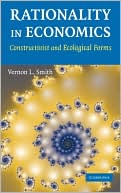

 |

|

Sold Out
Book Categories |
Preface xiii
Acknowledgments xix
Introduction 1
Rationality, Markets, and Institutions 13
Rediscovering the Scottish Philosophers 15
Exchange in Social and Economic Order 15
Lessons from Scotland 18
On Two Forms of Rationality 24
Introduction 24
Constructivist Rationality 26
Limitations and Distractions of Constructivist Rationality 32
Ecological Rationality 36
Implications 41
Impersonal Exchange: The Extended Order of the Market 43
Relating the Two Concepts of a Rational Order 45
Introduction 45
Airline Route Deregulation 47
The California Energy Crisis 50
Economic Systems Design 53
Constructivism as Rational Reconstruction of Emergent Order 57
Market Institutions and Performance 61
Knowledge, Institutions, and Markets 61
The Iowa Electronic Market 68
Strategy Proof-ness: Theory and Behavior 70
Did Gresham Have a Law? 74
Market Power and the Efficacy of Markets 75
Equilibrium with a Dominant Firm? 75
The Ethyl Case and Antitrust Policy 77
Gasoline Market Behavior and Competition Policy 81
Predatory Pricing 83
Entry Cost and Competition: Contestable Markets Theory 86
Asymmetric Information and Equilibrium without Process 94
Rationality in Asymmetric Information Markets 94
The Neoclassical Synthesis 101
Hayek and the Hurwicz Program 104
Experimental Markets with Asymmetric Information 108
Markets for Quality 109
Labor Markets and Efficiency Wages 111
FCC Spectrum Auctions and Combinatorial Designs: Theory and Experiment 115
Introduction 115
Auctions: Modeling Institutions 116
Economics of English Auctions 117
Independent Private Values 118
Common Values 121
Review of Relevant Experimental Results 125
Single Object Auctions 126
Common Value Auctions 126
A "Winner's Curse" in Private Value English Auctions for Gambles? 127
Jump Bidding and the Class of Badly Performing Multiple-Unit English Auctions 127
The English Clock Corrects Bad Performance 130
Combinatorial Auctions 131
Tests of SMR and a Proposed Alternative 133
The FCC Auction Design Process 137
Auction Design for Complex Environments 140
The Combo Clock: Simple Solutions for Complex Auctions 141
Implications for the Design of Spectrum Auctions 144
Psychology and Markets 149
Psychology's Challenge to Constructivist Rationality 149
Psychology, Economics, and the Two Forms of Rationality 156
What Is Fairness? 161
Examples of Fairness 163
Fairness: An Experimental Market Test 166
What Is Rationality? 168
Economic Survival versus Maximizing Utility 169
Maximizing the Probability of Survival 169
Maximizing Expected "Profit," or Discounted Withdrawals 172
Is It Rational to Be "Rational"? 173
Literature Background 176
Modeling Net Subjective Value 177
Examples from Experiments 179
Monetary Incentives: Further Discussion 180
Rationality in Collectives and the Sense of Number 182
Market Rationality: Capital versus Commodity and Service Flow Markets 186
Personal Exchange: The External Order of Social Exchange 189
Emergent Order without the Law 192
Rules and Order 192
Ellickson Out-Coases Coase 196
The Effects of Context on Behavior 199
Introduction and Elementary Theoretical Background 199
Perspectives on Interpreting Results 200
How Does Context Matter? 202
Anonymity as a Treatment Procedure 204
Perception, Context, and the Internal Order of the Mind 206
The Significance of Experimental Procedures 209
Overview of Experimental Procedures 211
The Ultimatum Game Example 212
Dictator Games 220
Behavioral Deviation from Prediction: Error, Confusion, or Evidence of Brain Function? 227
Investment Trust Games: Effects of Gains from Exchange in Dictator Giving 234
A Celebrated Two-Stage Dictator Game 234
Reciprocity or Other-Regarding Preferences? 237
Reciprocity in Trust Games 245
Introduction 245
Trust Games without a Punishment Option 250
Why So Much Cooperation? 253
Is It the Subjects? Undergraduates versus Graduates 253
Machiavelli, Trust, and Cooperation: Mandeville's Knaves? 254
Is It Utility for Other Payoff? 257
Reciprocity versus Preferences: Does Own Opportunity Cost Influence Other Choice? 260
Extensive versus Normal (Strategic) Form Games 264
Trust Games with Punishment Options 267
Self-Regarding Cooperation in Repeat Play? Protocols with and without Direct Punishment 272
Effect of Matching Protocol on Frequency of Cooperation in Trust Games with and without Punishment 274
Comparison of Behavior in the Repeated Play of Extensive and Normal Form Games 274
A Matching Protocol Based on Sorting for Cooperative Behavior 275
Order and Rationality in Method and Mind 281
Rationality in Science 283
Introduction 283
Rational Constructivism in Method 285
Can We Derive Theory Directly from Observation? 285
Economics: Is It an Experimental Science? 290
What Is the Scientists' qua Experimentalists' Image of What They Do? 296
Auxiliaries and the Ambiguity of Rejecting the "Test" Hypothesis 297
A D-Q Example from Physics 298
A Proposition and Some Economics Examples 300
The Methodology of Positive Economics 304
In View of Proposition 2, What Are Experimentalists and Theorists to Do? 304
Experimental Knowledge Drives Experimental Method 305
The Machine Builders 308
Technology and Science 308
Technology and Experimental Economics 309
In Conclusion 311
Neuroeconomics: The Internal Order of the Mind 312
Introduction 312
Individual Decision Making 314
Rewards and the Brain 316
Strategic Interaction: Moves, Intentions, and Mind Reading 316
What Are the Neuroeconomic Questions? 317
A Summary 322
References 329
Index 353
Login|Complaints|Blog|Games|Digital Media|Souls|Obituary|Contact Us|FAQ
CAN'T FIND WHAT YOU'RE LOOKING FOR? CLICK HERE!!! X
 You must be logged in to add to WishlistX
 This item is in your Wish ListX
 This item is in your CollectionRationality in Economics: Constructivist and Ecological Forms
X
 This Item is in Your InventoryRationality in Economics: Constructivist and Ecological Forms
X
 You must be logged in to review the productsX
 X
 X

Add Rationality in Economics: Constructivist and Ecological Forms, , Rationality in Economics: Constructivist and Ecological Forms to the inventory that you are selling on WonderClubX
 X

Add Rationality in Economics: Constructivist and Ecological Forms, , Rationality in Economics: Constructivist and Ecological Forms to your collection on WonderClub |